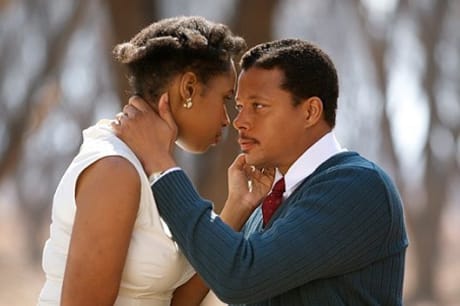South African director Darrell Roodt's style, or auteur vision, if you will, might be best described as "television-friendly." What this means is that Roodt's lexicon of politically motivated titles has been exceptional only in its flatness and astoundingly superficial approach to storytelling.
Some would argue that this distance gives balance and perspective on the pedagogy at hand, while others would say that it's merely a sheer lack of vision and understanding of the medium.
His approach to the life of Winnie Mandela (played here by Jennifer Hudson) continues this trajectory, following the broad outlines of Anne Marie du Preez Bezdrob's biography, which was a bit like a textbook itself, without any motivational or character-shaping embellishments to contextualize the onslaught of blandly conceived events in her tumultuous life.
Jumping through time without a great deal of framing or warning, Winnie details the controversial titular activist's experiences from intelligent, privileged child to social worker to wife of Nelson Mandela (Terrence Howard) to incisive political activist. Every event is depicted with very little humanity or intensity, making it blend like a series of cheap television re-enactments.
This is particularly clear when Nelson's courting of Winnie is limited to a brief smirk and a painfully expository single scene of conversation to indicate "love." Neither of the main characters are given any ire beyond their core political beliefs and the rapid progression through the years makes it nearly impossible to get a sense of who they are.
Exacerbating this removed, careless approach to the material is the casting of Hudson and Howard in roles far beyond their scope and capacity. There's something laughable about their strained attempts to energize such lethargic material, especially when neither party suit the larger-than-life figures they're attempting to portray, regardless of their sincere efforts to make it work.
Even the stickier material in Winnie's life, such as later fraud charges and murder allegations, is eschewed in favour of the same cold, disengaging staging that reduces her to mere signifiers and newspaper headlines. There is absolutely nothing to learn from this movie that couldn't be gleaned from a Wikipedia article.
(D Films)Some would argue that this distance gives balance and perspective on the pedagogy at hand, while others would say that it's merely a sheer lack of vision and understanding of the medium.
His approach to the life of Winnie Mandela (played here by Jennifer Hudson) continues this trajectory, following the broad outlines of Anne Marie du Preez Bezdrob's biography, which was a bit like a textbook itself, without any motivational or character-shaping embellishments to contextualize the onslaught of blandly conceived events in her tumultuous life.
Jumping through time without a great deal of framing or warning, Winnie details the controversial titular activist's experiences from intelligent, privileged child to social worker to wife of Nelson Mandela (Terrence Howard) to incisive political activist. Every event is depicted with very little humanity or intensity, making it blend like a series of cheap television re-enactments.
This is particularly clear when Nelson's courting of Winnie is limited to a brief smirk and a painfully expository single scene of conversation to indicate "love." Neither of the main characters are given any ire beyond their core political beliefs and the rapid progression through the years makes it nearly impossible to get a sense of who they are.
Exacerbating this removed, careless approach to the material is the casting of Hudson and Howard in roles far beyond their scope and capacity. There's something laughable about their strained attempts to energize such lethargic material, especially when neither party suit the larger-than-life figures they're attempting to portray, regardless of their sincere efforts to make it work.
Even the stickier material in Winnie's life, such as later fraud charges and murder allegations, is eschewed in favour of the same cold, disengaging staging that reduces her to mere signifiers and newspaper headlines. There is absolutely nothing to learn from this movie that couldn't be gleaned from a Wikipedia article.




